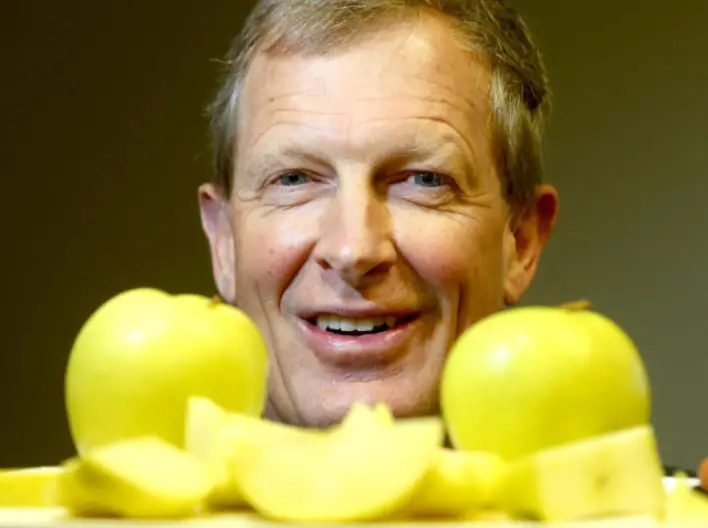
Arctic Apple Founder Neal Carter. Photo via Ottawa Citizen.
The new genetically engineered apple is finally set to hit store shelves this fall, and like most pro-GMO companies its creator, Canada-based Okanagan Specialty Foods, is dead set on not labeling its controversial new product.
According to a new article from the website MIT Technology Review, the company’s founder Neal Carter recently spoke at a presentation in San Francisco about the apples, which have been created using the CRISPR technique (a new type of genetic engineering) to not turn brown like conventionally bred and organic apples, allowing for a longer shelf life.
While over 90 percent of Americans routinely state that they want mandatory GMO labeling in national polls, the lack of support from lawmakers has led to the situation unfolding in plain view today: the new GMO apples will not be labeled, leading many to wonder whether consumers will be left in the dark about what they may be eating.
“We Didn’t Want to Put a Skull and Crossbones on the Package”
According to the article, the new GMO apples will appear in hundreds of stores in California and the Midwest, but they will not be labeled due to a decision from Okanagan’s management.
The company says they have a benefit for the consumer in the form of “convenience,” but criticis say that the apples only have benefits for food service companies who want to be able to serve them long past their usual expiration date.
Despite high numbers of petition signatures against them, the apples were approved by the FDA and do not have to be labeled due to a bill signed by the Obama administration in 2016 allowing companies to put QR codes on packages instead of plain text food labels stating that they are genetically modified.
“We didn’t want to put ‘GMO’ and a skull and crossbones on the package,” said Carter during a presentation in San Francisco according to the article, on why his company decided not to label the apples as GMOs.
Detoxify your body with Organic Supergreens,
From Paleo Valley!
Big Sale for the New Year – Click Here to Begin Shopping
***
“I don’t think we’re hiding behind the fact that we use that technique,” Carter also said according to CBCNews in January of this year about GMO labeling. “We don’t want to demonize the product by putting a big GMO sticker on it.”
Since their introduction to the food supply in 1994 (with the ill-fated FlavrSavr GMO tomato), GMO foods have not been labeled in the U.S., a right afforded to citizens in over 60 countries worldwide.
Carter’s comments are reminiscent of a seminal moment in GMO history in 1994, when Norman Braksick, president of the Asgorw Seed Company (a subsidiary of Monsanto), said the following to the Kansas City Star: “If you put a label on genetically engineered food you might as well put a skull and crossbones on it.”
More than 20 years later, Americans still don’t have GMO labeling, and still wonder about the long-term effects of these lab-created food crops (which are banned in more than 30 countries worldwide).
New Unlabeled CRISPR GMO Technology Raises Concerns
While some may see Carter’s quote as a sarcastic swipe at anti-GMO activists, others see the non-labeling of these GMO foods as a very serious issue, especially in light of new research and the lack of long-term safety testing (studies are capped at 90 days and some question the industry’s cozy ties with the U.S. government leading to GMOs’ introduction and proliferation).
In June 2017 a study came out from Columbia University showing that the CRISPR genetic engineering process is capable of causing “hundreds of unintended gene mutations” within the organism, surprising researchers, who called for a closer look.
While it is not known how this may affect humans or whether gene edited CRISPR foods such as GMO apples have similar issues, the study raised plenty of eyebrows among scientific community members who believe the technology should be better regulated.
***
Best Organic Supergreens Powder, On Sale Now
23 Organic Superfoods in 30 Seconds Per Day
***
Currently the industry is seeking to exempt such CRISPR-created foods from being classified as genetically modified; in the meantime, labels are still not required.
Meanwhile, the watchdog organization Friends of the Earth called the new GMO apples “understudied, unlabeled, and unnecessary.”
Others including GMO Free USA and The Non-GMO Report point out that non-browning apples grown and hybridized in the field are already available (Opal apples).
Neil Carter’s GMO Apples Brought to Market — Even With Health Concerns
Carter and his company, which sold for $41 million in 2015 to the American Biotech company Intrexon, remained steadfast and brought their GMO apples to market despite customer objections.
Many busy moms and other consumers will likely purchase the new GMO apples without knowing their true origin.
“We see this as less about genetic modification and more about convenience,” Carter said about the benefits of the new GMO apple according to The Independent.
The apples will be sold in 10 oz. pre-sliced bags with the Arctic logo on them.
But for consumers already wary of unlabeled food experiments, Carter’s quote on GMO labeling may remind them of another in the controversial foods’ history.
“Monsanto should not have to vouchsafe the safety of biotech food. Our interest is in selling as much of it as possible. Assuring it’s safety is the FDA’s job,” said Monsanto director of corporate communications Phil Angell as quoted by Michael Pollan in the New York Times in 1998.
This article was first written in 2017 and updated in February 2024.
***
***
Thanks for installing the Bottom of every post plugin by Corey Salzano. Contact me if you need custom WordPress plugins or website design.





